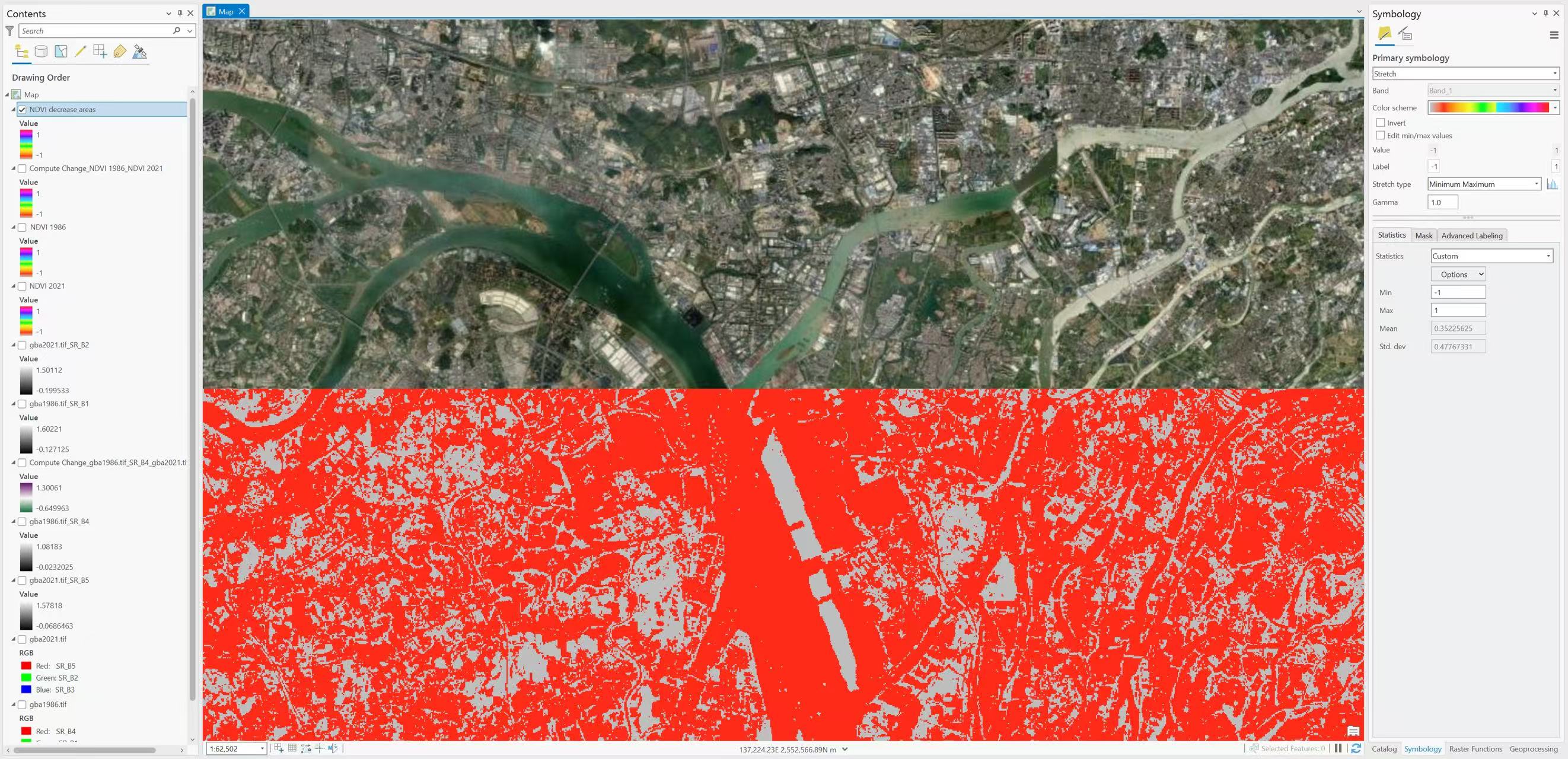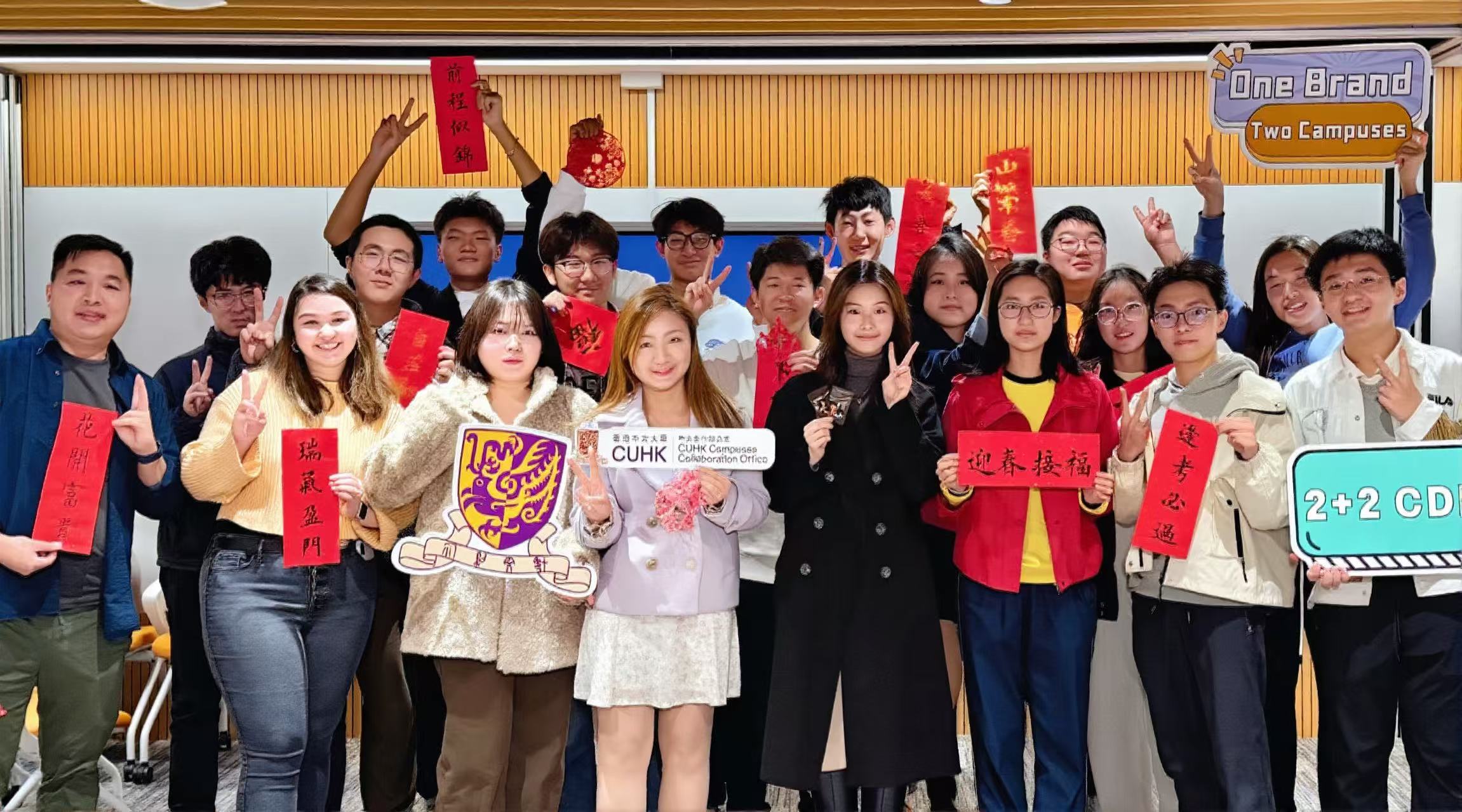"A Tale of Two Campuses" : Collaborative Double Major Students Embodying Shenzhen and Hong Kong Campus Integration
"Returning to the Hong Kong campus, I often forget to bring cash or my Octopus card because I've gotten used to the 'convenience' of the Shenzhen campus—entering the library with facial recognition, shopping without a wallet, and having food delivered in half an hour..." said student Zhang Zuning.
"The other day, my classmates and I ran into our geography professor on campus, and he immediately invited us to observe a satellite assembly," shared by student Liu Sizhe.
These anecdotes capture the real-life academic experiences of students enrolled in the collaborative double major programme across the Shenzhen and Hong Kong campuses.
On 13 October 2022, The Chinese University of Hong Kong, Shenzhen (CUHK-Shenzhen) and The Chinese University of Hong Kong (CUHK) officially launched a collaborative double major programme. Marking the first initiative in the Guangdong-Hong Kong-Macao Greater Bay Area (GBA), this programme enables students to pursue dual majors across both campuses. Starting with the launch of the "Interdisciplinary Data Analytics & X" double major in 2023, the programme expanded in 2024 with the addition of the "Aerospace Science and Earth Informatics & X " double major, followed by the introduction of the "Materials Science and Engineering & X" double major in 2025. Participants spend two years each in Shenzhen and Hong Kong for studies, research, and fieldwork, experiencing a cross-city blend of academic and living experiences. This initiative not only transcends geographical boundaries but also deeply integrates educational resources, writing a vibrant new chapter for the Greater Bay Area's educational innovation. We interviewed several students from both campuses to share their dual-city academic journeys.
Interdisciplinary Data Analytics & X:
Zhang Yifan, Zhang Fengfu (2023 intake, admitted via Shenzhen campus)
Aerospace Science and Earth Informatics & X:
Liu Xingle, Liu Sizhe (2024 intake, admitted via Shenzhen campus)
Zhang Zuning (2024 intake, admitted via Hong Kong campus)
?
Double Major Programme: Interdisciplinary Opportunities and Challenges
The cross-disciplinary curriculum expands both knowledge and competencies, equipping students with diverse prospects while navigating challenges. "Aerospace Science and Earth Informatics leverages remote sensing to study Earth from a macro-scale perspective —analyzing phenomena like vegetation dynamics or hydrological changes. These images blend science and beauty," said Liu Xingle (Electrical and Computer Engineering& Aerospace Science and Earth Informatics), with palpable passion. He admitted the appeal lies in interdisciplinary application: "Combining programming skills with spatial data enables me to process information more efficiently." Zhang Zuning (Aerospace Science and Earth Informatics& Physics), admitted via the Hong Kong campus, was drawn to cutting-edge courses: "CUHK's satellite research program is pioneering. The double major provides concurrent paths for me to dive into my interests while building foundational knowledge." The interdisciplinary approach transcends classrooms, reshaping mindsets. Liu Sizhe (Urban Management& Aerospace Science and Earth Informatics) noted that cross-disciplinary learning exposes her to diverse fields—from "hard" tech like satellite data analysis to social sciences like urban policy, expanding future opportunities beyond a single domain. Initially planning a humanities career, she discovered a passion for scientific research through this collision of disciplines.

Image information processed by Liu Xingle
Professors from both campuses ignite curiosity through dynamic teaching. Liu Xingle recalled a Hong Kong professor using a Pikachu figurine to explain physics laws, "making theory come alive." Liu Sizhe highlighted faculty accessibility: "Professors actively share opportunities, like encouraging us to participate in workshops or competitions." She even received an impromptu invitation from a geography professor she met on campus to observe CUHK's Research Centre for Satellite Remote Sensing.
However, cross-campus course selection demands careful planning. Zhang Yifan (Financial Engineering& Interdisciplinary Data Analytics) highlighted discrepancies: "Advanced calculus at the Hong Kong campus covers single-variable content exclusively, so I had to self-study multivariable calculus back in Shenzhen." Fortunately, program offices at both campuses provide dedicated guidance. Zhang Zuning echoed this: "I had to strategize credit requirements and timelines. Missing a Shenzhen-specific calculus course would delay advanced coursework, though approvals are flexible, proactive planning is crucial." Such challenges, he added, ultimately serve as catalysts for growth.
?
Cross-City Life: Where Difference Sparks Dialogue
Where Shenzhen and Hong Kong converge, their disparities breathe through life's crevices. Liu Xingle joked, "Hong Kong canteens are too light for my Chongqing palate—I often return to Shenzhen to satisfy my cravings." Conversely, Zhang Zuning (from Hong Kong) embraced Shenzhen's efficiency: "I've adapted to mobile payments, facial recognition access, and 30-minute food delivery—life feels fast-forwarded here."
Language barriers pose common challenges. "Daily life in Hong Kong requires Cantonese—from convenience stores to some gym classes... It was tough initially, but classmates were willing to help translate," Zhang Yifan recalled. Colleges bridge these gaps by fostering cultural exchange. Students from Hong Kong, mainland China, and beyond bond through hikes, cooking, picnics, and birthday celebrations—turning differences into cohesion.

Spring Festival Event for Collaborative Double Major Students
Both campuses also host diverse activities, from academic talks to sports and clubs. Zhang Fengfu (Computer Science& Interdisciplinary Data Analytics) joined a Hong Kong singing contest: "I didn't advance, but music is my escape." In Shenzhen, he performs with the music club and the University Arts Center.
?
Finding Direction Through Every "Cross-Border" Journey
The programme not only consolidates the academic resources from both campuses but also broadens the horizons of students, fundamentally reshaping their cognitive frameworks. Students unanimously credited the programme with honing their self-management and strategic planning competencies. More significantly, they learned to leverage differences as resources and examine issues through multidimensional lenses, enhancing capabilities not only in academic planning and time allocation, but also expanding their career vision.
"This program is for students willing to explore. We're not just taking classes in two cities; we're learning how to turn differences into resources. You'll experience Hong Kong's culture, engage with people from diverse countries and regions, and broaden your horizons," Zhang Yifan advised students interested in the program. "Don't just bury yourself in coursework. Explore the resources of both campuses, immerse yourself in Hong Kong's cultural richness, and transform the Shenzhen-Hong Kong dual-city experience into your competitive edge"—this is a shared perspective among students. Transcending Shenzhen and Hong Kong is not merely a geographical crossing; it's an expansion of vision and possibility. Find your direction in every 'crossing' between the two cities, and locate your coordinates on the world map. Like debugging code until it finally runs smoothly—that moment is the answer for the youth of the Greater Bay Area.
?
Shenzhen-Hong Kong Campus Collaboration: From Institutional Synergy to Innovative Integration
The double major program embodies deep institutional collaboration, enabling seamless student mobility through robust logistical and academic support from both campuses. Beyond the classroom, it unlocks exceptional practical opportunities. For instance, Zhang Yifan and Zhang Fengfu gained firsthand exposure to Greater Bay Area enterprises in Foshan, Guangzhou, and Macau during their first-year summer session. As sophomores, they will conduct case study research in Indonesia. These immersive experiences stem from the program's distinctive "Co-operative Education Programme," which includes paid full-time internships in the third-year summer and fourth-year first semester. "The pressure is real, but it's career-defining," Zhang Yifan noted.
Beyond academics, integration spans Colleges lives, research, and exchanges in both campuses. Sister colleges host joint events: Ling College and United College planted "Care-Free Trees" for eco-initiatives; Harmonia College and New Asia Colleges co-organized corporate tours; Minerva College students competed in CW Chu College's Golden Melody Singing Contest; and Diligentia College and United Colleges launched a French immersion program in Lyon. These activities form fertile ground for talent development.

Academic collaboration is further strengthened through regular faculty workshops and strategic development seminars, deepening ties in education, research, and student affairs, A groundbreaking Ph.D. co-supervision initiative began in 2022–2023, formalized by memorandums signed between CUHK-Shenzhen's School of Science and Engineering and School of Data Science, and CUHK's Faculty of Science and Faculty of Engineering. For undergraduates, a formal exchange agreement was established in 2024, building on existing summer programs. Since 2016, 438 CUHK-Shenzhen students have participated in exchange programs with CUHK, including 62 students in summer session and 5 in semester-long programs in 2024. Additionally, CUHK-Shenzhen funds 10–15 undergraduates annually for international summer courses at CUHK.





